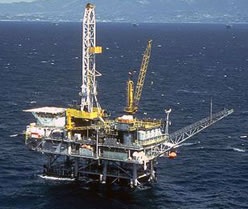 Library Photo: Showing Ghana's oil bloc
Library Photo: Showing Ghana's oil bloc
Parliament has been called to reject the Petroleum Exploration and Production Bill 2014 and adopt a Production Sharing Agreement (PSA).
The call was made by the Association of Chiefs and Queens for Justice, Peace and Reconciliation and the Ghana Institute of Governance and Security (GIGS).
Addressing a news conference in Accra, they said the fiscal provisions of the Bill were based on a hybrid system- the Modern Concession or the Modern Royalty Tax System and was only an attempt to give retrospective legal backing to agreements and contracts signed from 2000 till date.
Togbe Doklo Akumsa VI, Dufia of Adume-Avenorpedo, Secretary of the Association said the hybrid system would not be beneficial to Ghanaians.
He said the implication of passing the Bill into law, would mean taking away all the sole rights and controls granted to the Ghana National Petroleum Company under PNDC laws 64 and 84.
The two laws placed the ownership of oil blocks in private hands contrary to section 1(I) of PNDC law 84, article 257, section 6 of the 1992 Constitution and the 1962 UN General Assembly Resolution on Permanent Sovereignty over Natural Resources (GRA 1803), and Charter of Economic Rights and Duties of States (GRA 3281) 1974.
Togbe Akumsa VI said available statistics showed that Ghana would have earned $ 6.428 billion as at end of December 2014 if it was operating under the PSA, instead of the $ 2.75 billion earned during the same period.
He said many emerging African countries in oil and gas have signed onto the PSA and they include Kenya, Uganda, Sierra Leone, Senegal, Tanzania and Togo who are also frontier nations yet to start production.
“Tullow, the major player in the industry in Ghana, is comfortable entering into Production Sharing Agreements with Uganda, Kenya, Ethiopia, Equatorial Guinea, Gabon, Cote D’Ivoire, Congo Brazzaville, Mauritania and Sierra Leone,” he said.
Togbe Akumsa said records available at the Oxford Institute of Energy Studies and the Barrow Company Incorporated revealed that earlier agreements entered into by Ghana before 2000 were PSAs based on the PNDC Law 64 and the Petroleum Exploration and Production Law 84.
“It is noteworthy that 81 countries in the world, with 34 in Africa producing oil and Gas according to our investigation, have signed into the Progressive and Equitable PSA,” he said.
Togbe Akumsa said Ghana is bound to lose more than $ 40billion of oil revenue from the Jubilee Fields alone if the fiscal provisions of the Hybrid System in the Petroleum Exploration Bill 2014 are passed.
He said the two associations, therefore, called for the withdrawal of the Bill and a subsequent independent review of all contracts and agreements signed so far to reflect a Production Sharing Agreements Fiscal Regime and to conform to the tenets of existing and subsisting laws on the statute books.
Mr Solomon Kwawukume, Senior Research Officer (Oil and Gas) at the GIGS said the current hybrid system being practiced is a modification of the royalty tax system that was used to govern the gold extraction sector and this allowed foreign oil companies to give the host country a percentage of the oil lifted.
He said currently, Ghana only received 10 per cent carried interest and also contributes towards daily operating and technical costs, aside contributing to the capital development cost.
He explained that the agreements and contracts signed from 2000 till date were at variance with provisions of the Laws 64 and 84, which were the framework for managing the Upstream Petroleum Industry in Ghana.
Mr Kwawukume said these laws were crafted to suit the Production Sharing Agreement system, which it described as “the most progressive, equitable and fairer fiscal regime or arrangement in sharing petroleum revenue in the world”.
He said the approval of the Bill would be against the wishes and aspirations of the people of Ghana, “as we need a fair and equitable PSA laws like those of Angola, South Sudan, Kenya, Tanzania, Trinidad and Tobago and Malaysia”.
Mr Kwawukume said although they are not against investment in the sector, they only want a fair share of the oil and gas resources for Ghanaians in accordance with the constitution and the United Nations charter and resolutions on natural resources.
He said a national stakeholders’ forum should be held to discuss and debate the appropriate fiscal regime to adopt to govern the exploitation of petroleum resources in the country.
Mr Kwawukume called on interested stakeholders including the Council of State, National House of Chiefs, former Presidents of the country, the Asanteman Council, former UN Secretary General; Mr Kofi Annan and the Christian and Muslim Councils to prevail on President John Dramani Mahama to withdraw the Bill to save Ghana from economic loss.